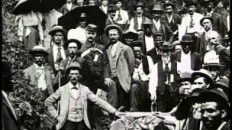The Reformation (alternatively named, the Protestant Reformation or the European Reformation[1]) was a movement within Western Christianity in 16th-century Europe that posed a religious and political challenge to the Roman Catholic Church—and papal authority in particular. Although the Reformation is usually considered to have started with the publication of the Ninety-five Theses by Martin Luther in 1517, there was no schism between the Catholics and the nascent Lutheran branch until the 1521 Edict of Worms. The edict condemned Luther and officially banned citizens of the Holy Roman Empire from defending or propagating his ideas.[2] The end of the Reformation era is disputed: it could be considered to end with the enactment of the confessions of faith which began the Age of Orthodoxy. Other suggested ending years relate to the Counter-Reformation, the Peace of Westphalia, or that it never ended since there are still Protestants today.
Movements had been made towards a Reformation prior to Luther, so some Protestants in the tradition of the Radical Reformation prefer to credit the start of the Reformation to reformers such as Arnold of Brescia, Peter Waldo, Jan Hus, Tomáš Štítný ze Štítného, John Wycliffe, and Girolamo Savonarola.[a] Due to the reform efforts of Hus and others in the Lands of the Bohemian Crown, Utraquist Hussitism was officially acknowledged by both the Pope and the Holy Roman Emperor, although other movements were still subject to persecution, including the Lollards in England and the Waldensians in France and Italian regions.
Luther began by criticising the sale of indulgences, insisting that the Pope had no authority over purgatory and that the Treasury of Merit had no foundation in the Bible. The Reformation developed further to include a distinction between Law and Gospel, a complete reliance on Scripture as the only source of proper doctrine (sola scriptura) and the belief that faith in Jesus is the only way to receive God’s pardon for sin (sola fide) rather than good works. Although this is generally considered a Protestant belief, a similar formulation was taught by Molinist and Jansenist Catholics. The priesthood of all believers downplayed the need for saints or priests to serve as mediators, and mandatory clerical celibacy was ended. Simul justus et peccator implied that although people could improve, no one could become good enough to earn forgiveness from God. Sacramental theology was simplified and attempts at imposing Aristotelian epistemology were resisted. Read More.
























